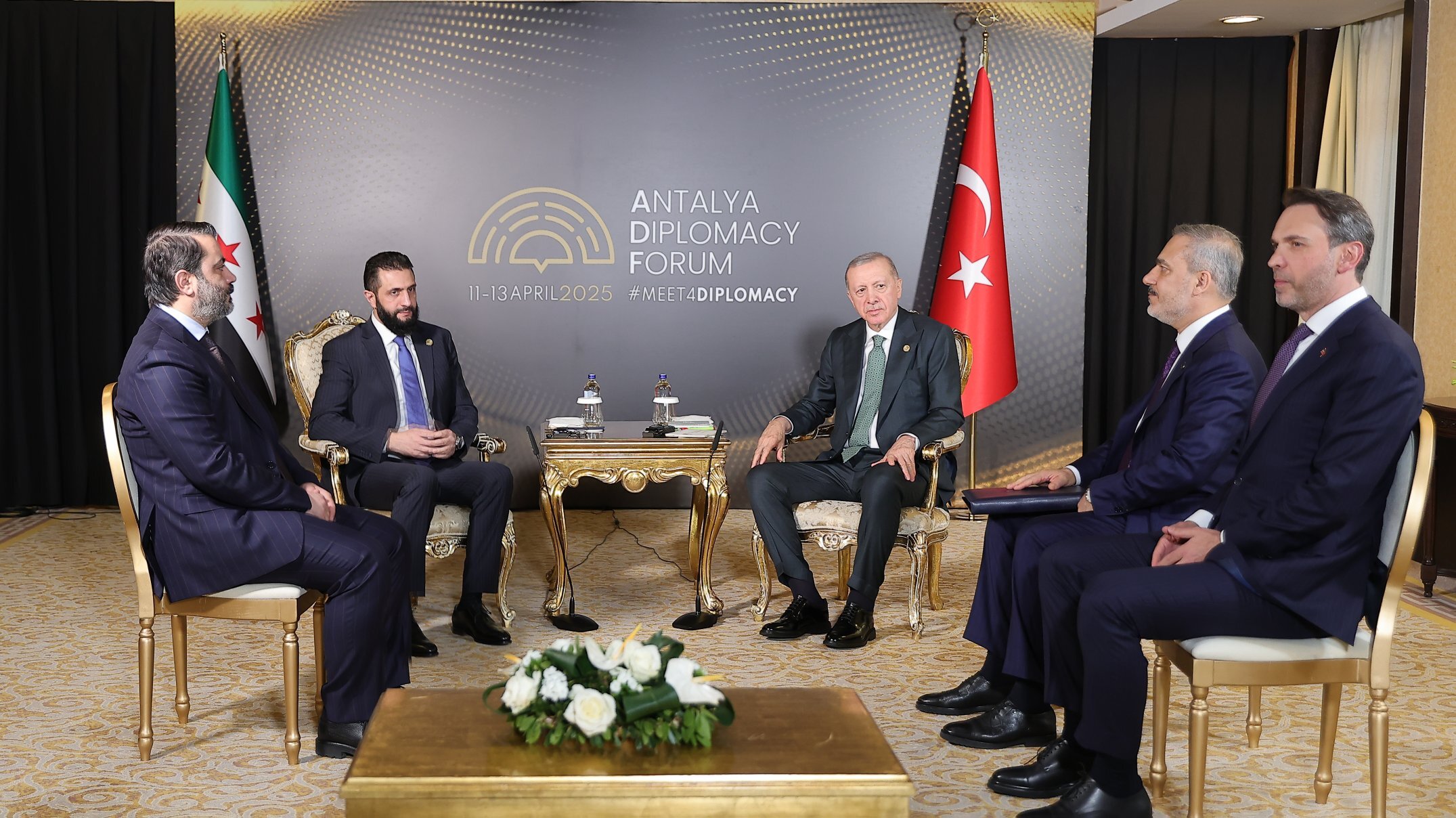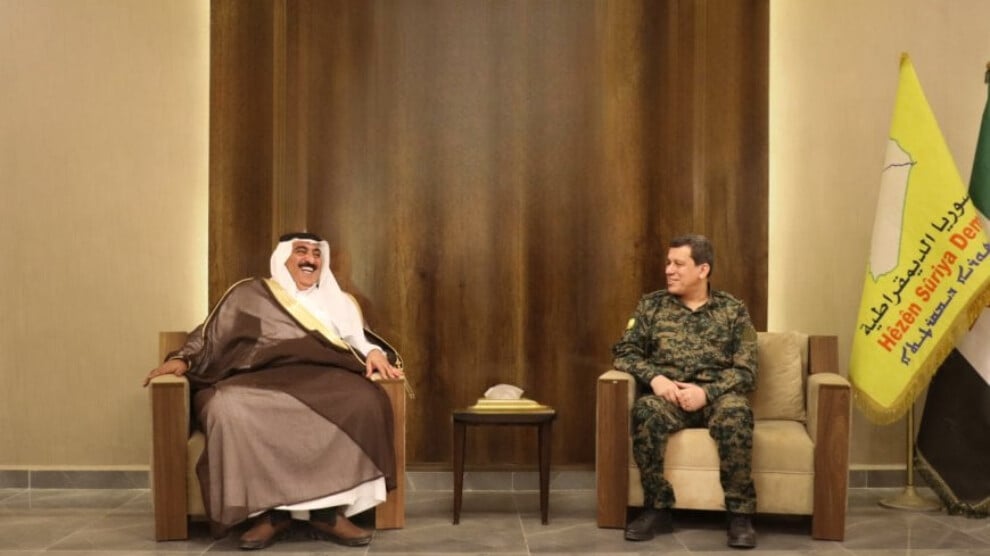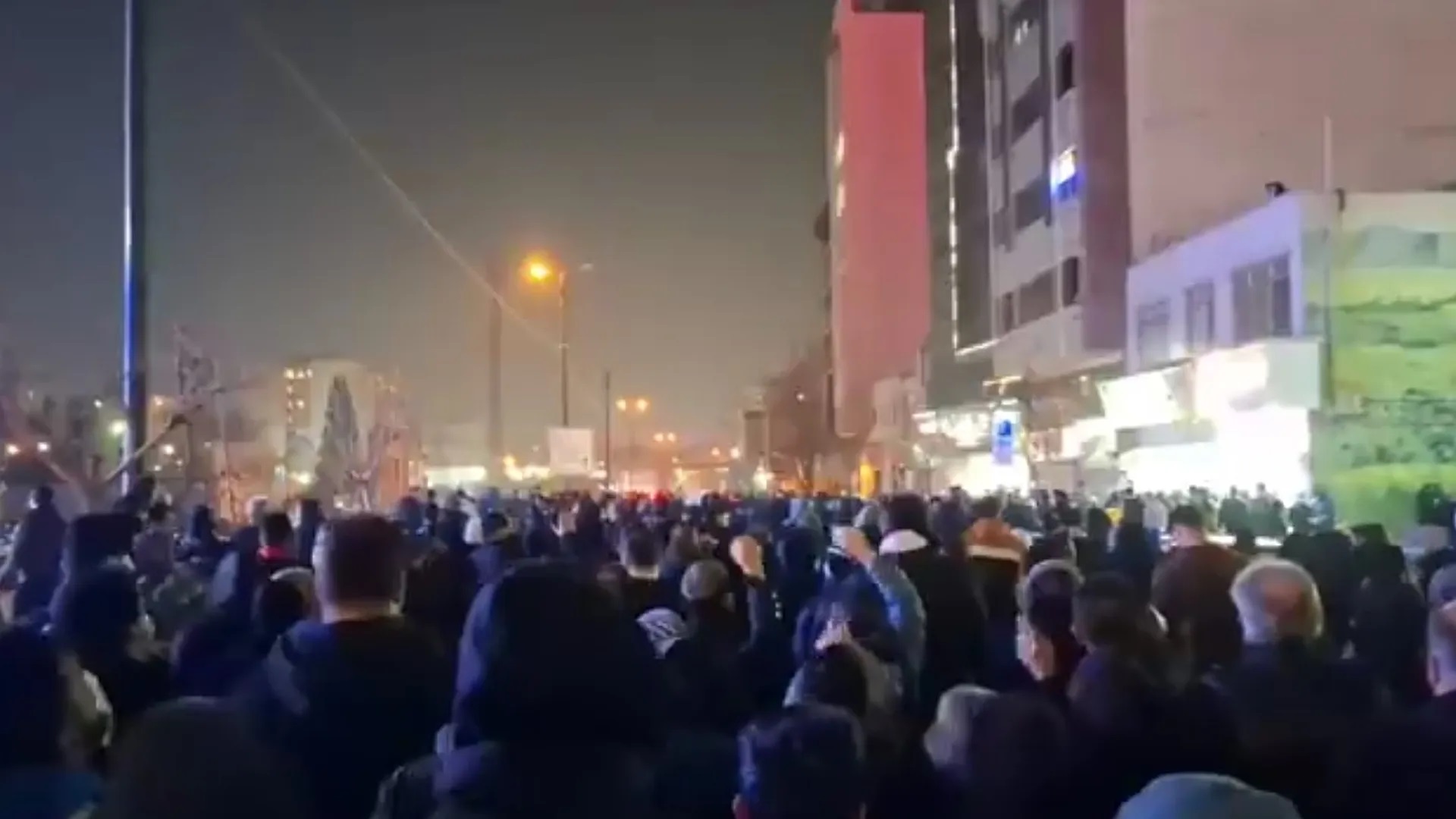Erdogan, Al-Sharaa Leave the U.S. With No Major Change of Course on Kurds

Picture credit: Syrian Presidency Twitter Account
The 80th General Assembly marked Syria’s first appearance on the world stage in fifty years and secured Turkish President Recep Tayyip Erdogan a highly sought-after White House visit. However, despite the spectacle, neither leader achieved significant gains, and Washington’s stance on Syria, Turkey, and the Kurds remained unchanged.
Economic engagement and Israel’s regional war were priorities for both governments, superseding the Kurdish issue in public messaging.
The 80th United Nations General Assembly brought Turkish and Syrian leaders to the United States to make the case for support as both governments claim that deals with Kurdish actors in their respective countries will be finalized before the year’s end. Economic engagement and Israel’s regional war were priorities for both governments, superseding the Kurdish issue in public messaging. The United States plays no role in the Turkey-PKK peace process and does not appear to have changed its policy of support for a negotiated settlement between the Kurdish-led Syrian Democratic Forces (SDF) and the Syrian transitional government.
Syria
The unconditional repeal of all remaining U.S. sanctions is a priority for Syria’s new state
Syrian transitional president Ahmed al-Sharaa’s speech to the UN General Assembly was the first by any Syrian leader in over 50 years. The UN had to temporarily waive terrorism sanctions to allow him to travel to New York. His message focused on reconstruction and economic development; his first major appearance was at the Concordia Summit, described as a forum ‘dedicated to finding market-driven, cross-sector solutions to the world’s most pressing challenges.’ The unconditional repeal of all remaining U.S. sanctions is a priority for Syria’s new state, which governs a population of whom 90% live in poverty and which will require an estimated $250–400 billion to rebuild. Without economic stability, the new government will find it difficult to consolidate political stability and power. Openness to foreign investment also helps supersede remaining international concerns about HTS’s jihadist past.
Sharaa and his delegation also discussed their relationship with Israel. From the General Assembly pulpit, he expressed solidarity with the Palestinian people and condemned Israel’s war. While rumors initially spread that a Syria-Israel de-escalation agreement would be signed under U.S. auspices, Reuters reported that talks broke down over an Israeli demand for a humanitarian corridor to the Druze-majority region of Suwayda in southern Syria.
On SDF integration, Damascus stuck to its talking points: promises of minority rights and assertions that all arms must be in the hands of the state. Both are yet to materialize on the ground.
On SDF integration, Damascus stuck to its talking points: promises of minority rights and assertions that all arms must be in the hands of the state. Both are yet to materialize on the ground. The constitutional declaration names Islamic law as a ‘primary source’ of legislation, recognizes only Arabic as an official language, and, in an overt Ba’athist holdover, continues to designate the multiethnic country as an ‘Arab republic.’ Turkey-backed Syrian National Army (SNA) militias have their command structures intact despite claiming to have integrated. Irregular tribal militias committed sectarian abuses alongside government forces in Suwayda earlier this year.
Turkey
Turkish President Recep Tayyip Erdogan won a coveted White House visit after failing to receive an invitation under the Biden administration. U.S. Ambassador to Turkey Tom Barrack said prior to the meeting that the U.S. intended to offer Erdogan ‘legitimacy.’ Once again, trade and investment topped the substantive agenda. Turkey signed deals on natural gas and civilian nuclear cooperation.
Long-standing challenges in the U.S.-Turkey relationship were on the table. Erdogan and Trump have both expressed optimism about the prospect of lifting sanctions that prevent Turkey from acquiring F-35 fighter jets. However, under U.S. law, this requires Turkey to abandon its Russian S-400 missile systems – a goal waiting behind serious domestic and international hurdles. In Washington, many members of Congress oppose the F-35 sale for reasons beyond Turkey’s rapprochement with Russia.
…responding to Turkish criticism of U.S. efforts to end wars in Gaza and Ukraine, U.S. Secretary of State Marco Rubio said that Turkey had been ‘begging’ to be a part of U.S.-led processes.
At the United Nations, Erdogan dedicated much of his floor speech to condemning Israeli atrocities in Gaza. A moment of tension occurred when, responding to Turkish criticism of U.S. efforts to end wars in Gaza and Ukraine, U.S. Secretary of State Marco Rubio said that Turkey had been ‘begging’ to be a part of U.S.-led processes.
Erdogan also met with Sharaa on the sidelines of the General Assembly. A Turkish readout stressed that Ankara was closely following the implementation of the March 10th agreement – but beyond this, there was little public messaging on the Syrian Kurdish issue and none at all on Turkey’s domestic peace process. The open threats that preceded Turkey’s October 2019 invasion of Serekaniye and Tal Abyad were nowhere to be seen.
U.S. Policy and the Kurdish Peace Processes
The sole U.S. comment on northeast Syria following the Trump-Erdogan meeting came from Ambassador Barrack, who made characteristically contradictory observations, arguing that Syria should be ‘centralized’ but that nation-states had never worked in the Middle East. The U.S. continues to support the implementation of the March 10th agreement. With the December 2025 time frame for the conclusion of the integration swiftly approaching and little progress on the ground, it is unclear whether or how their engagement will qualitatively change. There does not seem to be any appetite for a new Turkish military intervention, even as the U.S. urges the SDF to make more concessions to Damascus.
The 2026 National Defense Authorization Act (NDAA), which funds the U.S. defense budget, reflects the legislative branch’s perspective. For the budget to pass, both chambers of the U.S. legislature – the Senate and the House of Representatives – must agree to a single text. Currently, the House version of the NDAA imposes conditions on the repeal of Syria sanctions, while the Senate version does not. Both versions appropriate funding to the SDF for the upcoming fiscal year, suggesting that some level of U.S. engagement in the northeast could continue even as the U.S. consolidates forces there.
A focus on investment and trade suggests a preference for stability in Syria and, thus, for the avoidance of any SDF-HTS confrontation.
A focus on investment and trade suggests a preference for stability in Syria and, thus, for the avoidance of any SDF-HTS confrontation. Opponents of sanctions relief will be able to use any resumption of violence as a powerful argument for their case. Investors may be cautious about pouring cash and resources into a country on the brink of a new civil war. Escalation in Syria, leading to conflict between Turkey and Israel, both allies of the United States, may also shape this view. Both countries seek to capitalize on the gap left by Iran’s regional setbacks, and commentators close to both governments are increasingly pointing to the other as a threat. Washington likely hopes to avoid a scenario in which two major state allies in the region come to even indirect blows. Ultimately, war and peace depend far more on internal dynamics in Turkey and Syria than on American influence. Neither the central government has been willing to make any concrete legal and institutional changes to accommodate Kurdish demands despite months of meetings on both sides of the border. Implemented peace deals by the end of 2025 are wildly unrealistic. Whether looming deadlines will spark creative diplomacy or a return to war remains to be seen. For the time being, the status quo of diplomatic traffic, fragile ceasefires, and media wars continues.
Meghan Bodette
Meghan Bodette is the Director of Research at the Kurdish Peace Institute. She holds a Bachelor of Science in Foreign Service from Georgetown University, where she concentrated in international law, institutions, and ethics. Her research focuses on Kurdish issues, with a focus on human rights, peace and democracy; women’s rights; and Turkey’s cross-border military operations in Iraqi Kurdistan and northern Syria. She has briefed officials from governments and international institutions on her findings, and has been interviewed by national media including NPR and NowThis for her expertise.

![[Amargi Exclusive] In the Zagros Mountains, PJAK’s Co-chair Says Iran has “Already Collapsed” and Warns Against “Another Dictatorship”](https://cms.theamargi.com/wp-content/uploads/2026/01/ressize-Screenshot_2026-01-12_at_15.05.23-1.png)

